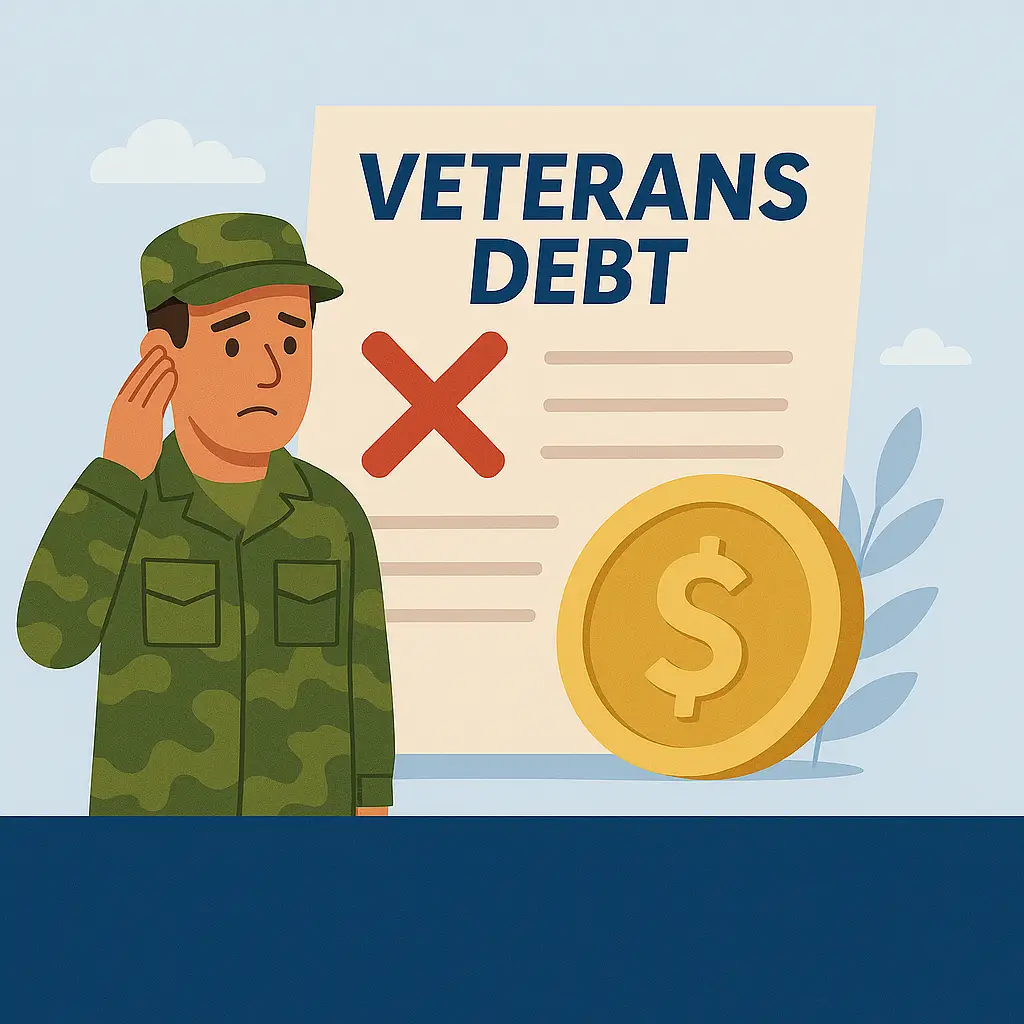Guide to Veteran Debt in the United States
What Is Veteran Debt?
Veteran debt refers to financial obligations owed by former members of the U.S. Armed Forces. It can include general consumer debts (like credit cards and personal loans), but also debts specifically linked to VA benefits, such as overpayments for disability compensation, pension, VA home loans, or education benefits (e.g. GI Bill).
Debts involving the Department of Veterans Affairs (VA) often result from overpayments due to administrative errors, delayed or incorrect updates, or changes in eligibility that were not promptly reported by veterans or their families.
Why Do Veterans Accumulate VA-Related Debt?
- Overpayment of Benefits: The VA may later determine that a veteran received more than they were eligible for.
- Eligibility Changes: If a veteran’s status, income, or family circumstances change, they may be retroactively ineligible.
- Delayed Updates: System delays and paperwork issues may result in incorrect payments.
- Home Loan Defaults: Veterans may default on VA-guaranteed mortgages, leading to debt or foreclosure.
- GI Bill Adjustments: Changes in school enrollment or program eligibility can trigger repayment demands.
The VA Debt Collection Process
- Notice of Debt: The VA sends a letter detailing the amount owed and the reason.
- 30-Day Response Window: You generally have 30 days to respond to a VA debt notice, but specific deadlines may apply for requesting a hearing or waiver depending on the type of benefit involved.
- Collection Actions:
- VA may offset future benefits
- Referral to the Department of the Treasury for further collection
- Credit reporting (resumed in 2024 after pandemic pause)
- Treasury Offset Program: May garnish federal tax refunds or Social Security payments.
Options to Resolve VA-Related Debt
- Waiver Request: The VA may waive or cancel collection of certain overpayment debts, especially in cases of hardship, but this is not automatic and each case is reviewed individually.
- Dispute the Debt: Challenge the validity or amount within the deadline.
- Compromise Offer: Negotiate to pay a reduced amount.
- Payment Plan: Set up monthly installments with the VA’s Debt Management Center (DMC).
- Veteran Service Organizations (VSOs): Many provide free assistance for navigating the VA debt process.
Consumer Rights and Protections (Veteran Debt)
Federal Protections
- The FDCPA applies only when a VA-related debt is assigned to a private collection agency, not when the VA or Treasury is collecting directly.
- Veterans have the right to:
- Request written validation
- Dispute the debt within 30 days
- Be protected from abusive or deceptive collection practices
Additional Veteran-Specific Protections
- Servicemembers Civil Relief Act (SCRA): Provides some protections for debts incurred during active duty.
- Wage Garnishment by VA: The VA can garnish wages to collect certain debts, but must provide written notice at least 30 days in advance and give the veteran an opportunity to dispute the debt or arrange repayment. Court approval is not required, but strict administrative procedures must be followed.
- Access to Legal Aid: Veterans may qualify for free legal assistance via VA-recognized nonprofits or legal clinics.
State and Federal Variations
- State Licensing Requirements: Still apply to third-party collectors even for VA debts.
- Statute of Limitations: For VA-related debts, federal law allows the VA to collect by administrative offset (such as withholding federal payments) for up to 10 years from the date the debt becomes delinquent. State law may further limit the ability to enforce collection through the courts.
- Protections for Disabled Veterans: Some states offer added protection against asset seizure or garnishment.
States Where Debt Collectors Do NOT Require a License (as of 2024)
Georgia, Kansas, Kentucky, Michigan, Missouri, Montana, New Hampshire, Oklahoma, Pennsylvania, South Carolina, South Dakota, Tennessee, Wyoming
Check with your state consumer affairs office to verify current licensing requirements.
Why Licensing and Advocacy Matter
- You can dispute unlicensed collection efforts in states that require registration.
- Veteran Service Officers (VSOs) can assist in appeals, disputes, and waivers.
- Licensed collectors must follow strict conduct guidelines when collecting VA-related debts.
How to Verify a VA Debt or Collector
- Review the VA debt letter for specifics
- Contact the VA Debt Management Center: 1-800-827-0648
- Request a written breakdown of charges and dates
- Check if the collector is licensed in your state
- Get help from a VSO or legal aid if unsure
Options for Veterans with General Consumer Debt
Veterans struggling with non-VA debt (credit cards, loans, etc.) can explore:
- Debt settlement (DIY, attorney, or company)
- Hardship programs with creditors
- Bankruptcy (Chapter 7 or 13, with some exemptions for VA income)
- Debt validation and credit repair
Key Takeaways
- Veteran debt can stem from VA benefits, home loans, education programs, or standard consumer credit.
- You have specific rights and options to resolve or dispute VA debt.
- Always respond within 30 days of a VA debt notice to preserve your rights.
- Free help is available—don’t navigate this alone.

